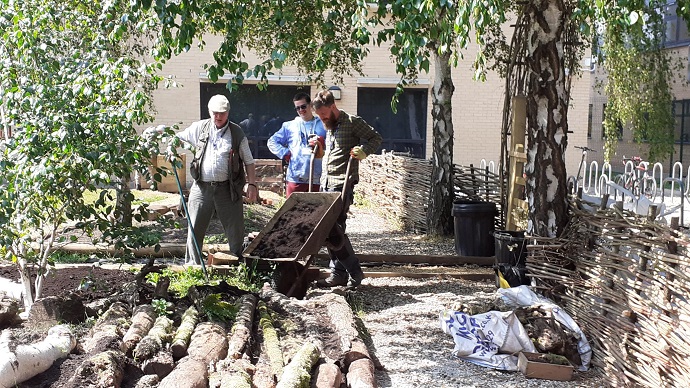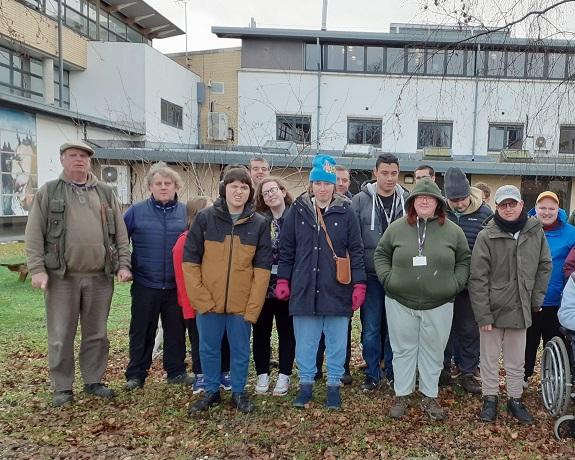Following a visit by a team of scientists from Sanger and the University of Oxford, an outdoor space at the college was chosen for the project and a thorough survey using set traps was used to determine the type of plants, their dimensions, and the size of raised beds required. The students also undertook their own survey the following month to quantify the diversity of bug life present to ensure that the environment was appropriate for other life forms to prosper.
This cross-departmental project has been established to foster scientific skills with the aim of increasing the employability of the college’s supported learning students. These young people, members of the Green Team, Aspire Groups and Horticulture Groups, are enrolled on programmes that are specifically designed to help develop their life skills and independence and to provide them with transferrable skills that will help them gain future employment. Furthermore, they provide opportunities for the learners to engage with the natural environment in their local community, with the resulting benefits that this brings to their own health and wellbeing needs.
This initiative, spearheaded by Dr. Nikki Chapman from the Wellcome Sanger Institute, was funded through an application to the Darwin Tree of Life project’s Enabling Communities Fund, which provided a budget set at £1,800. This money has financed the harvesting of willow to help form a fence and an arch, plant growth and imbedding, groundwork formation, raised bed creation, path excavation and fence construction. With the help of the college’s construction students, the result is now a space brimming with life, providing an oasis of tranquillity for humans to enjoy alongside their various shared inhabitants!
Jeremy Lloyd, Assistant Principal SEND & Designated Safeguarding Lead, of Cambridge Regional College, says, ‘This venture is part of the Darwin Tree of Life project, dedicated to understanding the genomes of all known species of animals, plants, fungi and protists in Britain and Ireland. This fantastic scheme actively supports students with their understanding of local biodiversity and is now well underway. Our opening ceremony, on the 16th June, is a chance for representatives from the Wildlife Trust, Wellcome Sanger Institute and more, to really see what has been established here – it’s incredible!
The students are now working hard to maintain and improve this new and exciting biozone which has significantly developed the garden area to encourage fauna onto the campus at Kings Hedges Road. Showcasing the ability of our students in areas such as budgeting, time-management, research skills, development of gross motor skills, tidying, preparing, planting, and developing wood skills, individuals have gained hands-on experience with a professional slant. Their drive to succeed has been inspiring to see and the hub itself is a wonderful attraction on campus welcoming a vast array of species to build their nests on the tree of life’s branches.’

Gordon Baines, Outdoor Education Instructor in the Supported Learning team, says, ‘The new space will give students an outside learning area for forest school and garden activity programmes, focussing on the environment, the different seasons and what suits a natural, outdoor place. It will offer students holistic growth through frequent sessions outside that supports exploration and aided risk taking in a variety of activities, with the aim of developing confidence, self-esteem, and hands-on work experience in a natural setting.’
Dr. Nikki Chapman, from the Wellcome Sanger Institute, says, ‘What I enjoy about working on the Darwin Tree of Life project is how its huge geographical scope is so tightly linked to local activities. While our scientists are scouring habitats across Britain and Ireland in a mission to find every species and sequence their genomes, the project also supports local biodiversity and people, connecting those same scientists with their communities. It has been amazing to work with such a dedicated team at Cambridge Regional College, and I am excited to see how their efforts bear ecological fruit.’
With the new inclusion of wildflowers, plans for the biodiversity hub are to continue growing blooms, blossoms and more, that will provide bursts of colour to attract pollinators such as bees, butterflies, and other wildlife. Students also plan to build bug hotels and beetle banks to increase on the energy and excitement that is developing as part of the Sanger Project.



